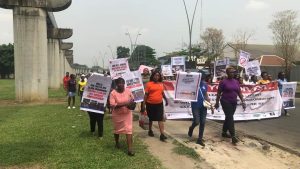…Want Fubara to take legal action to stop AGIP, EXON MOBIL
A coalition of women focused organisations working in the Niger Delta and knowledgeable about the evil trail of havoc wreaked on the region’s ecosystem and livelihood, have called on the Ahmed Tinubu government to halt the planned signing of the onshore divestment agreement with Agip and Exon Mobil.
In a joint press briefing held Thursday February 22 at the office of the foremost women NGO in the region, Kebetkache Women Development and Resource Center in Port Harcourt, the coalition demanded that there should be no divestment without proper Federal Government guideline on addressing the damages to the environment being exited and due consultation to with affected host communities.
They raised concern that, “ecological degradation caused by oil extraction forces women increased poverty and ill-health and as the bigger bearers of the deprivations from displaced livelihood, the exiting oil companies should establish women development funds to support the affected women.
The coalition made up of NGOs and community based organisations from Rivers, Bayelsa and Akwa Ibom states, insist that the IOCs are divesting to escape responsibility while the incoming companies do not have the capacity to address the huge liabilities they are meant to acquire.
To ensure the citizens do not suffer from the divestment, they called on the Rivers State Governor, Similaiyi Fubara, to act by instituting an injunction to stop the Federal Government from signing any further onshore divestment plan without ecosystem restoration.

Full text of the press release read: “Kebetkache Women Development and Resource Centre and their allied community-based women organizations express profound dismay at the announcement by Shell to sell off their on-shore assets to investors without conducting necessary consultations with communities that have endured decades of environmental destruction from their operations.
“It has come to our attention that plans are ongoing by Shell PLC to sell their shares in Shell Petroleum Development Company (SPDC) to a consortium of investors, Renaissance Africa Energy. OML 34 had already been divested to ND Western; OML 17 and OML 29 have been divested without proper guidelines.
“Additionally, Nigeria Agip Oil Company (NAOC), Exxon Mobil Nigeria Limited, and Total Energies Nigeria Limited, are poised to divest all their onshore assets without engaging host communities and rectifying the damages done to the environment and the well-being of peoples. They are attempting to evade responsibility!
“As affected women in the Niger Delta, we are deeply concerned about the swift nature of these divestment plans, as the government has not provided guidelines to ensure the resolution of pollution issues before SPDC, AGIP, and Total Energies depart. The corporations involved have failed to establish women development funds to support those who have borne the consequences of their oil extraction activities.”
“In the Niger Delta, women bear the brunt of oil exploitation, facing deprivations due to environmental degradation. They play vital roles in securing the family’s subsistence income through agricultural activities, processing farm produce, and engaging in trade. The ecological degradation caused by oil extraction forces women to navigate polluted swamps for their economic activities, leading to a decline in crop yields and increased poverty.
“We, the women, are in the dark regarding the reputations of the new companies acquiring the assets of Shell, AGIP, and Exxon Mobil. We implore the government, whom we hold in high esteem, not to approve the divestment plans until polluted farmlands are cleaned up and restored by these companies.
“Gas flares persist in Ebocha, Ibeno, Umuechem, and other areas, with communities like Otuabagi still grappling with the impacts of oil extraction. Farming, fishing, and hunting have been severely affected, leading to health problems among women exposed to hydrocarbons.
“This divestment is not in the interest of the community people, and we condemn the attempt by International Oil Corporations to shirk responsibility under the guise of selling assets. We call on the President of the Federal Republic of Nigeria to ensure no divestment without ecosystem restoration!
“The government must mandate companies divesting their oil assets to commit to cleaning all polluted sites in the Niger Delta and restoring lost livelihood opportunities.”
Fielding questions on the oil-host communities’ reaction to the ongoing divestments, a community leader from Gokana (Ogoni) in Rivers State, Comrade Pius Dukor, who is also president of Pius Dukor Foundation, said, “We need to sensitise the people in authority so that they know the problems we are having. This is one of the key steps we are taking.
“You know that communities are not as buoyant as oil companies. We don’t have the military, we don’t have the wherewithal in terms of fighting. So, we are not fighting a physical fight. We are collaborating with others to get them to look at our plight, our problems,” he said.
Another community leader, from Emohua, Henry Eferegbo, said, “As communities, we have undertaken to raise alarm that these companies are divesting and running away, leaving their responsibilities for other companies that may not be able to take care of them.”
Eferegbo, who is also of OLEGH, said, “The saddest thing that we heard is that Shell and others are divesting to special purpose vehicles, that is, companies that you cannot hold to account.
“We are calling on the state government to wade into the matter. As Rivers people, Niger Delta people, it is incumbent on all the governors of the Niger Delta to save the lives of their people by calling on these companies not to divest, and asking them to restore the environment, restore the health of the people and restore their livelihood before they can divest,” he stated.
A walk protesting the divestment plan had also taken place.
Environmental organisations and activists have repeatedly condemned the onshore divestment move by the IOCs, calling for proper disengagement guidelines and mandatory cleanup and restoration of the destroyed onshore sites, but the Federal Government has yet to respond.